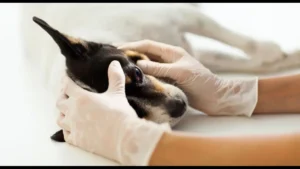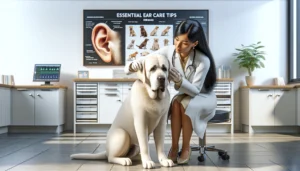As our beloved furry friends age, their health and care needs change. Therefore, we need to make changes to ensure that they live a happy and comfortable life. Senior dogs are typically dogs seven years of age or older who may develop health problems as they age. To provide the best care for your senior dog, consider these seven essential tips:
Table of Contents
Toggle1. Visit Your Vet Regularly:
Older dogs are more likely to have age-related health problems, such as arthritis, dental problems, and organ failure. To detect and treat these problems early, it is important to take your hat to the vet for regular checkups. Schedule checkups every six months or even every three months to monitor your senior dog’s overall health, including weight, mobility, and how vital organs are working. Blood tests and screening in older adults can help identify problems before they become serious so they can be treated and managed quickly.
2. A Balanced and Nutritious Diet:
An older dog’s diet is very important to maintain its health. As dogs age, their metabolism and food needs change. Switching to premium dog food can help your dog get the right balance of nutrients, including joint-boosting ingredients like glucosamine and chondroitin. Discuss with your vet what type of food is best for your older dog, taking into account factors such as his or her weight, activity level, and any pre-existing health conditions.
3. Control your Dog’s Weight:
Many older dogs become overweight, which can worsen health problems such as arthritis and diabetes. Feeding your senior dog a balanced, portion-controlled diet and regular exercise can help him maintain a healthy weight. Low-impact activities such as swimming, short walks, or gentle play can help you lose weight and keep your joints healthy without putting too much strain on already fragile joints.
4. Dental Care:
Older dogs often have problems with their teeth, which can lead to other health problems if not treated on time. Brushing your dog’s teeth and providing chews or toys should be part of your daily dental care routine. Also have your pet’s teeth professionally cleaned by your veterinarian, as recommended. Good oral hygiene contributes to your health by not only preventing tooth decay and gum disease but also by reducing the risk of infections in other parts of your body.
5. Joint Health:
Older dogs often suffer from arthritis and joint pain, which makes it difficult for them to move and can lead to injuries. As your vet recommends, you may want to give your dog a joint supplement to keep his joints healthy. Regular, gentle exercises help keep the muscles and joints flexible. To reduce pain in arthritic joints, make sure bedding is soft and comfortable, and consider using ramps or steps to help people climb onto furniture or get into their cars.
6. Mental Stimulation and Enrichment:
As dogs get older, their minds deteriorate, which can change their behavior and overall health. Use puzzle feeders, interactive toys, and age-appropriate games to keep your older dog’s mind active. Keep a regular schedule so they feel safe and praised for doing the things you want them to do. During your senior dog’s golden years, mental stimulation not only improves cognitive function but also helps him feel happy and content.
7. Make Sure Your Dog Feels Comfortable:
Make sure your senior dog feels comfortable and safe by meeting his specific needs. Make sure your sleeping area is warm, quiet, and easily accessible. A non-slip surface can prevent your dog from falling, especially dogs with arthritis or other mobility issues. To reduce strain on your neck and spine, consider raising your food and water bowls. To keep your senior dog comfortable and healthy, regular grooming, such as nail clipping and grooming, is important.
Conclusion
To properly care for an older dog, he needs regular visits to the vet, a healthy diet, help with weight management, dental care, joint health support, mental stimulation, and a comfortable living environment. By giving your older dog these concerns first, you can improve his quality of life and ensure that he enjoys his golden years of health and happiness. You should always speak to your veterinarian for advice specific to your dog’s needs and health concerns.
FAQs
1. How often should I take my older dog to the vet?
Your older dog should be taken to the vet for check-ups at least twice a year, or more often if your vet tells you to. Regular doctor visits can help you monitor your overall health, identify problems early, and ensure prompt treatment.
2. What changes should I make to the food my older dog eats?
To meet the changing nutritional needs of older dogs, it is best to switch to dog food made specifically for older dogs. Talk to your vet about the best diet for your pet based on his weight, activity level, and pre-existing health conditions.
3. How can I prevent my older dog from becoming too fat?
To control your weight, eat a balanced, portion-controlled diet and engage in regular, low-intensity exercise such as swimming or short walks. Controlling your weight is important to prevent or treat conditions such as diabetes and arthritis.
4. What can I do to keep my older dog’s teeth healthy?
Brushing your dog’s teeth and providing chews or toys should be part of your daily dental care routine. As your vet will tell you, you should have your pet’s teeth professionally cleaned every six months to prevent tooth decay, gum disease, and possible systemic infections.
5. Are there certain exercises I can do to help my older dog’s joints?
Exercises that are good for joints and muscles, such as swimming, short walks, and gentle play, can help them stay in good shape. Talk to your vet about the right joint supplements to help your pet’s overall health.
6. What can I do to keep my older dog’s mind active?
Use puzzle feeders, interactive toys, and age-appropriate games to keep your older dog’s mind active. Cognitive functions and emotional well-being can be improved by establishing routines and rewarding desired behavior.
7. What changes should I make to my older dog’s home?
Make sure everyone is safe and comfortable by providing a warm and accessible place to sleep. Make it more comfortable and cleaner by using non-slip surfaces, considering raised bowls for food and water, and taking care of grooming to prevent falls.


